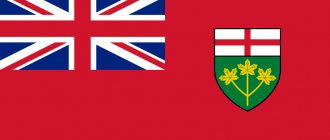The attractiveness of Switzerland for labor immigrants
What is the first thing anyone looks for when starting a new job? Obviously, these are working conditions and wages. So, those who are lucky enough to find a job in Switzerland don’t have to think about these questions.
GDP per capita is 81 thousand USD, which significantly exceeds the same figure in the USA (57.22 thousand USD). What can we say about Russia with a GDP equal to 26.49 thousand USD. It is no coincidence that Switzerland ranks second in the world in the Human Development Index (HDI), which characterizes the overall standard of living in the country. Therefore, our compatriots living in Russia, Ukraine and other countries of the former CIS, if such an opportunity arises, are happy to go to work in Switzerland.
Switzerland is not a classic country of emigrants, like, say, the USA. It is believed that everyone who comes here to work can only stay temporarily on the territory of the state.
Work quotas in Switzerland have been increased for residents of third countries, including Russia, Ukraine, and former CIS countries
In this regard, back in 1931, Switzerland adopted a law “On Foreigners”, aimed at reducing the influx of permanent labor migrants. This regulation has undergone a number of changes over time. Now the law is called “On Foreigners and Integration”.
Back in Switzerland, on 02/09/2014, a popular referendum was held, at which a decision was made to limit labor migration from the European Union and other countries, including Russia and Ukraine. Based on the will of citizens, amendments are constantly being made to the current legislation. But there are also certain difficulties. The referendum decision contradicts the bilateral agreement between Switzerland and the European Union on the free movement of citizens. The parties are still searching for a final format for resolving emerging issues.
The overall unemployment rate in Switzerland is low - about 3.3%. And in some cantons (territorial administrative unit), for example, Obwalden and Nidwalden - within 1%.
As before, today the country gladly hires qualified specialists with experience from Europe for highly paid jobs. But Russians, Ukrainians and residents of the former CIS countries are no less in demand. And this order applies despite any restrictions. The number of temporary labor immigrants working in Switzerland is approaching 320 thousand people.
Of course, you need to know the official language of the country. And there are four of them in Switzerland: French, German, Italian, Romansh.
Ways to find a job
Finding a job in Switzerland is not easy. There are quotas for immigrants seeking work in the country. They open at the beginning of the year, and are often exhausted before its end. Therefore, it is better to agree with the employer in advance in order to begin processing documents by the first months of the year.
First you need to find a vacancy. To find a job, you can contact the Swiss public employment service, recruitment agencies, or use family and business connections. View employment-related advertisements in the local press.
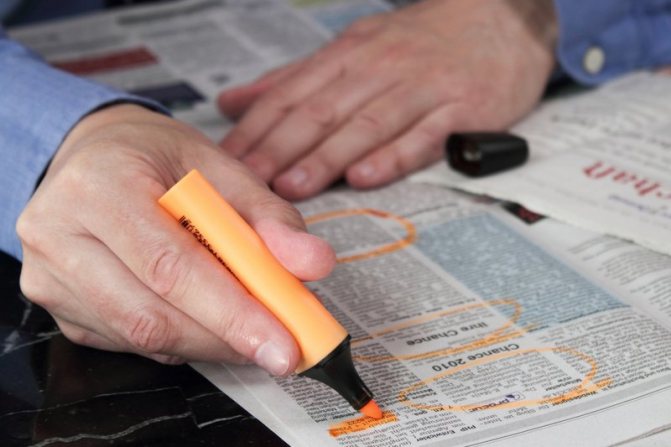
Searching for work in Switzerland through the local press gives a good chance of finding a job
Getting a job in Switzerland is quite difficult, since many Europeans are also focused on the local labor market. Competition for jobs here is constantly growing. For labor migrants from countries outside the European Union, Switzerland has special quotas. Therefore, qualified specialists, managers with impressive experience, as well as representatives of specialties that are in short supply on the Swiss labor market can count on finding employment in the country. A very big advantage for those wishing to find a job is having a higher education diploma issued by a Swiss university.
Alexey Melchenko
https://hyser.com.ua/economics/kak-ukraintsam-uehat-na-rabotu-v-shvejtsariyu-187153
Table: where to look for work in Switzerland
| Information about the resource | Website address |
| Swiss State Employment and Employment Service | job-room |
| The most famous job search resources | jobup jobscout24 jobwinner monster topjobs jobs |
| Job search aggregators | SimplyHired jobrapido xpatjobs neuvoo jobagent |
| A resource with a list of job search sites (over 170) in Switzerland | Palms |
| Contacts of Swiss companies | Swissfirms |
| Advertisements in the local press | Swiss Newspapers |
| Swiss recruitment agencies | Adecco Avg-seco Manpower |
| Employment in Eastern Switzerland | ostjob |
| Vacancies for top managers and financiers | Robert Walters Alpha |
| Jobs for IT specialists | darwin technojobs |
| Finding jobs and internships for university students and graduates | students graduateland iAgora |
Video: job search experience in Switzerland
How to find a job
You can apply for a special visa and look for vacancies while in the country, but often in this case you can only count on unskilled labor. To protect its citizens, the state introduces quotas for attracting foreign specialists, and the size of permits issued is reduced every year. Therefore, an employer interested in a unique foreign employee must first prove to the regional employment office (RAV) that he needs this particular specialist, and then complete all the necessary documents. For migrants who are interested in how to find work in Switzerland, we can recommend 3 main methods.
- Through the Internet. It should be noted that all local sites for finding work in Switzerland are in German, so at least minimal knowledge of it is necessary.
- Through friends or relatives living in the country. They can look for vacancies at their place of work, at the labor exchange or in newspapers.
- With the help of a specialized agency. This is the most convenient way, although financially expensive. But the company takes care of negotiations with the employer and paperwork.
Additionally, you can post your resume on a job search site, but the likelihood of getting a job without recommendations is very low.
Minimum and average wages in 2017
Over the past 60 years, at least 6 million people have moved to Switzerland for permanent residence (permanent residence), most of whom were labor migrants. And they went for high earnings.
Minimum wage
There is no legal minimum wage in Switzerland. After all, the country is a confederation. Each canton, of which there are 26, has its own laws, limited only by the Swiss constitution.
However, the minimum wage is set at each enterprise. This happens when a collective agreement is concluded. And all controversial issues must be coordinated with trade union organizations.

High Swiss salaries allow labor immigrants from Russia, Ukraine and neighboring countries to look into the future with confidence
The minimum wage in 2021 ranges from 3.5-4 thousand Swiss francs (CHF). Or almost the same amount in USD, since today CHF and USD are approximately equal. But this is for qualified employees. And, say, for professions such as janitor, cleaner, waiter, salesperson, hairdresser, the minimum can be one and a half to two times lower.
The question of establishing an official minimum wage of 4 thousand CHF was raised in a referendum held in Switzerland on May 18, 2014. But nothing worked out here either. The Swiss made a negative decision. Everything remained at the same level.
Average salaries
The Swiss Federal Statistical Office annually publishes and constantly updates data on the average salary for the country. For 2021 it is 6639 CHF per month.
According to statistics, salaries in Switzerland for men are slightly higher than for women. The difference is approximately 14.3%. In Switzerland there is also a 13th salary. It is paid at the end of the year.
There is a bit of bureaucracy and old-fashionedness in places, but basically everything is very modern and comfortable. And expensive. Everything is very expensive. Although local salaries are higher than the European average, and taxes are lower. Many modern trends are still not taken into account here. For example, they smoke a lot and do not sort garbage.
Anonymous
https://techvillage.ru/city/58-zurich-switzerland
Table: average monthly salary by region of Switzerland in 2017
| Region | Professional level | ||||
| Average values | Manager / highly qualified specialist | Middle manager / qualified specialist | Manager / specialist | Workers | |
| CHF | |||||
| Cantons of Valais and Vaud in the Lake Geneva region | 6320 | 10685 | 8735 | 6875 | 5697 |
| The cantons of Friborg, Bern, Neuchâtel, Solothurn and Jura, belonging to the Espace Mittelland region | 6314 | 9508 | 7389 | 66918 | 5946 |
| Northwestern Switzerland | 6664 | 10662 | 8707 | 7301 | 6049 |
| Zurich | 6832 | 12602 | 9707 | 7690 | 6039 |
| Eastern Switzerland | 6005 | 8587 | 7420 | 6298 | 5544 |
| Central Switzerland | 6400 | 9736 | 7825 | 6707 | 5872 |
| Ticino | 5294 | 8263 | 6331 | 5543 | 4793 |
| All Switzerland | 6639 | 10320 | 8284 | 6932 | 5844 |
Video: salaries of men and women in Switzerland
Average salary level in Switzerland
Taking into account all tax and social payments, the average salary in the country as a whole is 6,257 Swiss francs (the exchange rate of the Swiss currency today is almost equal to the US dollar). In its “dirty” form, without tax and social contributions, this amount is a little more than 10,000 francs.
Both industry and regional factors have a significant impact on the level of wages. The most prosperous in this regard is the largest city in Switzerland - Zurich, the average salary in which is 2,000 US dollars higher than the national level and amounts to more than 12,000 US dollars (however, in “pure” form it is 6,900 US dollars).
Overview of popular professions and salaries
In Switzerland, an experienced and qualified specialist will always be able to find a job. But there are other options. You can get a seasonal job. Usually Russians, Ukrainians and residents of the former CIS countries come to harvest in the summer. An excellent opportunity to make good money.
In Switzerland, representatives of blue-collar professions are in great demand: electricians, welders, mechanics, etc. At the same time, the employer needs high qualifications, confirmed by documents. Work experience also plays a big role in successful employment. Slightly less often, enterprises are looking for permanent and project managers. The demand for salespeople, financiers, accountants and engineers is stable.
According to statistics from the recruiting company Manpower, there is a significant imbalance in the Swiss labor market. Among the applicants, representatives of professions of mental work predominate, while enterprises are looking for assembly line workers. About 45% of unfilled vacancies remain unfilled due to a lack of required specialists. In another 31% of cases, companies cannot find employees due to the candidates’ lack of qualifications, experience, and education.

Foreigners in Switzerland most often work as cooks, builders, drivers, salespeople, and also occupy vacancies in the service sector: janitors, cleaners, hotel and restaurant employees. Many migrants work in the agricultural sector.
Table: salaries for different positions in Switzerland
| Profession | Average salary, CHF per month |
| Financial Director | 15833 |
| Doctor | 9375 |
| Programmer | 9344 |
| Engineer | 9042 |
| Lawyer | 9000 |
| Accountant | 8125 |
| Teacher | 7292 |
| Police officer | 6850 |
| Plumber | 6608 |
| Midwife | 6500 |
| Architect | 6250 |
| Social worker | 5900 |
| Mason | 5792 |
| Auto Mechanic | 5792 |
| Nurse | 5667 |
| Roofer | 5300 |
| Carpenter/painter | 5150 |
| Paramedic | 5050 |
| Gardener | 4400 |
| Hairdresser | 4375 |
| Driver | 4300 |
| Stewardess | 4209 |
| Handyman | 3600 |
Seasonal work in Switzerland
The most popular and fastest option to find a job is to become an agricultural worker. This type of work is always seasonal and depends on the chosen specialization of the Swiss agricultural sector. Such work usually falls during the summer months, where foreigners can work up to 12 hours a day, 6 days a week.
Since agricultural workers and service sector specialists are unskilled personnel, there are no special requirements for them, but knowledge of English at an average level of communication is required. Most often, Ukrainians and Russians are engaged in processing and harvesting agricultural crops. Seasonal work is the lowest paid, with average monthly earnings ranging from 2 to 4 thousand dollars per month.
But seasonal work in Switzerland also includes employment in the service sector - restaurant and hotel business. In the country, you can work seasonally in such professions as waiter, salesperson, maid, cleaner and assistant tour guide accompanying tourists. The season for such work falls in the summer months, when Switzerland experiences the main influx of tourists. In winter, ski resorts open and for 3-4 months you can actually work in the service sector. The salary level of workers is 2-5 thousand dollars.
Swiss tax system
Taxation in Switzerland is three-tiered. But the accrued amounts are not so large. All workers pay income tax on their wages. Foreigners who come to work in Switzerland are required to pay it 3 months after official employment.
Income tax at the cantonal or municipal level may vary. Central Switzerland is the most favorable in terms of taxation, and the highest payments are in Romandy, Neuenburg, Lausanne. Maximum rates, depending on the region, range from 13 to 19%. The total combined payroll tax usually does not exceed 25%.

In Switzerland, employees pay income tax to the federal, cantonal and local budgets.
The tax amount also depends on marital status—single people pay more. The rates in the table are for an unmarried, childless employee.
Table: taxes in Switzerland
| Federal taxes | Cantonal taxes | Municipal taxes |
| · accrual of interest on corporate income; · value added tax (VAT); · estimated direct tax; · personal income tax. | · for inheritance and donation; · on corporate net profit, including those received abroad; · to the ground; · for lottery winnings; · for keeping dogs; · for household personal use; · to entertainment venues; · for outdoor advertising; · to water supply units; · personal income tax. | · for consumption; · personal income tax |
Table: 2017 Federal Income Tax Rates
| Taxable annual income ( CHF ) | Basic tax ( CHF ) | Rate based on excess amount (%) | |
| 0 | 14 500 | – | – |
| 14 500 | 31 600 | – | 0,77 |
| 31 600 | 41 400 | 131,65 | 0,88 |
| 41 400 | 55 200 | 217,9 | 2,64 |
| 55 200 | 72 500 | 582,2 | 2,97 |
| 72 500 | 78 100 | 1 096 | 5,94 |
| 78 100 | 103 600 | 1 428,6 | 6,6 |
| 103 600 | 134 600 | 3 111,6 | 8,8 |
| 134 600 | 176 000 | 5 839,6 | 11 |
| 176 000 | 755 200 | 10 393,6 | 13,2 |
| More than 755,200 | 86 848 | 11,5 | |
The highest paid professions in Switzerland
Diplomats receive the highest salaries in this country - 13,800 Swiss francs per month. Second place goes to air traffic controllers with a salary of 13,340 francs, and third place to information services architects with a salary of 10,400 francs.
Table: the highest paid professions in Switzerland.
| Profession | Monthly salary (expressed in Swiss francs) |
| Actuary | 8 620 |
| Business analyst | 8 219 |
| Accountant | 6 885 |
| Vet | 8 800 |
| Military officer | 6 450 |
| Doctor | 10 123 |
| Investment Banker | 9 100 |
| Engineer programmer | 6 750 |
| Bank manager | 10 370 |
| Pilot | 7 792 |
| Police officer | 5 550 |
| Priest (high rank) | 8 340 |
| Teacher | 7 108 |
Work time
The working week in Switzerland ranges from 40 to 50 hours. Supermarket employees, technical and office staff work less, their work week is limited to 45 hours.
Swiss law does not prohibit recycling. But overtime is paid with a 25% premium. You can refuse the additional payment by taking time off.
Part-time work is also used. For example, you can get a job at 90% of the base rate. In this case, an additional day off accrues in two weeks.
What a foreigner must have to work in Geneva
- Know the local language. Knowing English will not hurt, but it is not enough to work in Switzerland. It is imperative to learn the basics of one of the officially approved languages in Switzerland. Thus, in Zurich, Basel and Bern, knowledge of the German language is welcome; in the western part of the country you cannot do without French; in the south, Italian is popular.

So working in Switzerland without knowledge of languages is quite problematic. - Be qualified. As mentioned above, a candidate for a prestigious job must have a higher education and preferably work experience. Also, the qualification must be in accordance with Swiss standards. In this case, you must resort to the confirmation procedure.
Social Security
In Switzerland, much attention is paid to the social security of its own citizens. The mere fact that social spending accounts for more than 25% of the country's GDP speaks volumes. The attitude towards migrants is strict. If foreigners who arrived on a work visa receive social benefits, their stay for the next year may not be extended.

Social protection of the population in Switzerland is at a high level
The following types of pensions are paid in Switzerland:
- by old age;
- upon the loss of the sole breadwinner;
- in case of loss of income;
- on disability;
- professional pension;
- from private pension funds.
Men in Switzerland retire at age 65, and women at age 64.
For social security, a tax is levied on workers; these are mandatory contributions. Rates may vary slightly between cantons.
Health insurance in Switzerland is not included in the mandatory social package of an employee. Everyone chooses it independently depending on their income level. An enterprise may enter into a collective insurance agreement on a voluntary basis.
Table: rates of deductions from wages to social funds in 2017
| Expense item | Bid (%) |
| To the pension fund for old age, loss of a breadwinner, loss of income, disability | 5,15 |
| Professional pension | 7,5 |
| In case of unemployment | 1,1 |
| From an accident | 0,7–3,4 |
Official employment
The employer is responsible for registering a foreign employee to work in Switzerland. Before getting into contact with him, it is advisable for specialists applying for a good position to take care of confirming their own university diploma. First of all, this concerns Russians, Ukrainians and residents of the former CIS countries.

Getting a good job in Switzerland will be easier for a qualified specialist with work experience and a confirmed university diploma
To confirm your diploma, you should go to the Swissuniversities portal and find there a list of professions recognized in Switzerland. If a suitable specialty is on the list, then you need to make a request through contact information about the possibility of legalizing the diploma. After a positive response, you should send a notarized copy of the diploma with a translation and apostille by mail. And wait for recognition.
The sequence of employment in Switzerland is as follows:
- Employee search for a vacancy, interview with the employer.
- Submitting an application for an employee to the cantonal employment service, where it undergoes preliminary review and approval. The employer submits the documents.
- Re-examination and approval of the application by the State Secretariat for Migration Issues.
- Obtaining a work permit.
- Applying for a work visa.
Work permit
The issuance of work permits in Switzerland is supervised by the employment service of each canton. The application is submitted by the employer.
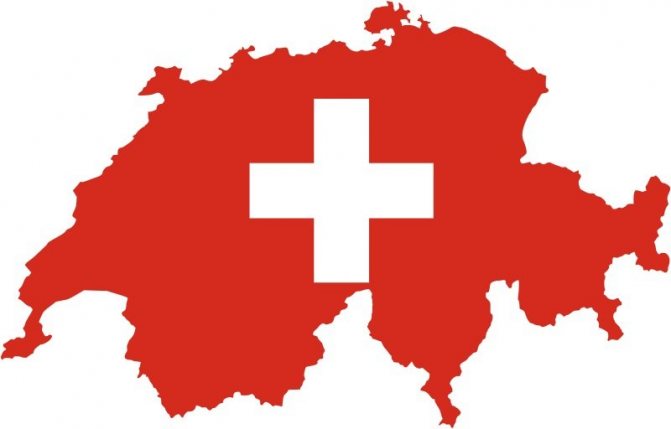
A work permit in Switzerland is issued through the employment service of the canton where the foreign specialist is employed
It is necessary to justify the feasibility of hiring a particular specialist. However, a Swiss citizen should not apply for the vacancy. You should pay attention to a small nuance. It is much easier for labor migrants from the European Union to get a job in Switzerland than for Russians, Ukrainians and residents of the former CIS countries. All because of quotas that limit the flow of foreigners into the country.
For 2021, the following quotas have been established for hired workers from third countries: 8 thousand permits in total, of which 3,500 are valid for a year and 4,500 for short-term work of no more than a year. If this number of employees is reached, the permit will not be issued.
Based on the work permit, a visa and residence permit (residence permit, residence permit) are issued in Switzerland.
Work visa and residence permit
A national work visa type D is issued at the Swiss consulate located in the country where the applicant lives.
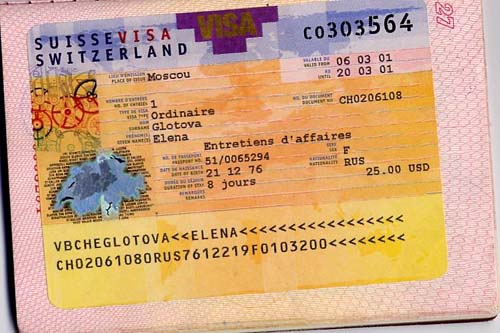
A visa is required to enter Switzerland
Documents required to obtain a visa:
- Standard application form. When filling out, one of the official languages is used.
- Four color photographs of ICAO standard.
- Original and two copies of international passport.
- The last two Schengen visas (if any).
- Documents confirming financial solvency.
- Confirmation of no criminal record.
- Work permit.
- Motivational note.
- Medical insurance policy.
Additional documents may be required. This is decided by the consular officer. A work visa is issued after a positive decision on the application. The processing time is six to eight weeks.
The visa is issued for the period specified in the valid work permit. After entering the country, you will need to obtain a residence permit.

There are several types of residence permits in Switzerland (depending on the purpose and duration of stay)
Categories of permits with employment opportunities:
- A - long-term business trips or fixed-term contract work. The permit is issued for a maximum of two years. Changing jobs is not allowed.
- B - long-term contract. The permit is issued for one year.
- C - permanent residence permit. You must stay in the country for ten years. After this, a change of workplace is allowed without re-issuing permits. You can open your own business and apply for citizenship.
- L - short-term permit for temporary work for up to a year.
A short-term permit does not give the right to extension. You will have to leave the country after the end of your work contract, unless there are other reasons to stay. In other cases, the document is renewed at the migration service if the job is retained by the foreigner.
Requirements for employees
The country is happy to offer jobs to highly qualified specialists with work experience, managers and workers in short supply. That is, Switzerland needs those personnel who can benefit not only the employer, but also the country as a whole.

A prerequisite for employment is:
- Knowledge of the language. Moreover, if an international company can be content with English, then other employers prefer to hire specialists who speak one of the official languages of Switzerland:
- German - east and central part;
- French - West;
- Italian - south.
Otherwise, it is almost impossible to get a job, unless we are talking about illegal immigrants, which carries considerable risks.
- Qualifications that include higher education and work experience. A foreign person must undergo a confirmation procedure in order to comply with Swiss requirements. A diploma from one of the universities in Switzerland will be a big plus for Russians. In the field of medicine, law, social work and teaching, confirmation of qualifications is clearly required.

- Quotas issued annually by the country for foreigners. Despite the decrease in the number of jobs in recent years for foreign persons from third countries (for Belarusians, Russians, Ukrainians), 2021 optimistically offered 1 thousand more permits. Once the limit ends, Switzerland will not issue work permits until next year. Regardless of the vacancy, a medical examination will be required within the first two days of arrival in the country. Exceptions are for citizens of the EU, Australia, New Zealand, the United States, journalists and artists,
- Conditions and remuneration. This point should not separate a citizen of another country from Swiss society. That is, a migrant, like a Swiss citizen, should be employed on an equal basis. In general, the country is very sensitive to this issue. Even when applying for a residence permit, the migrant is checked for his ability to adapt to life in Swiss society. Of course, the criteria are: age, language, professionalism, personal qualities.
- But the most important condition is the availability of living space for the applicant. The number of working hours in a week should not exceed 50. Vacation is granted twice a year for 2 weeks. According to statistics, the minimum wage is $1,500 per month.
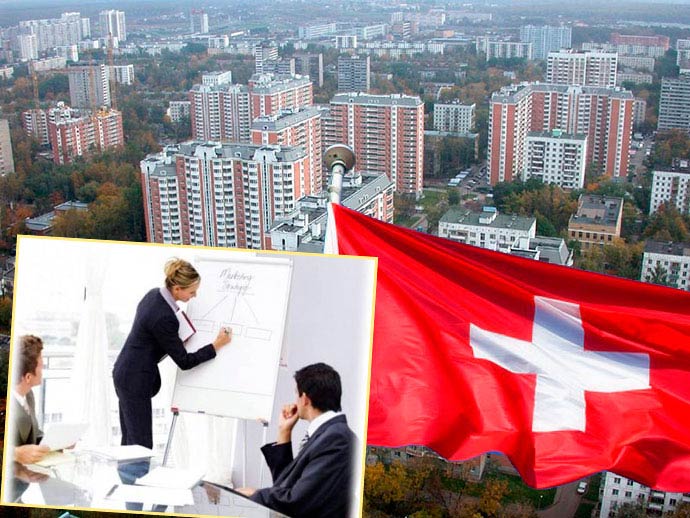
If we are talking about a specialist in short supply, the requirements are greatly simplified. The country is interested in people who can boost the economy and make a great contribution to its development.
Therefore, a system of quotas for jobs for foreigners is provided. The owner of a rare and sought-after profession will always find work, even in Switzerland.
Once a foreign person has found a suitable job or received an offer, this job will need to be approved. In this case, the employer must send an application to the local employment service for a decision.
At this stage, a difficulty awaits the employer, who must convince the local authorities that there are no applicants for the vacancy among Swiss citizens, the information about which was published in newspapers, employment offices, magazines, etc.
Once a positive decision is received, the documentation is sent to the State Secretariat for Migration or SEM for approval. Once it is issued, all interested parties are notified in writing.
Next, the local service sends a document to the Consulate confirming the possibility of issuing a work visa to the foreigner.
How to look for work in Switzerland
There are several options for finding a suitable place. You can use online resources such as:

You can search for work through recruitment agencies - Adecco, Manpower and others. If you need a complete list, it's better to look at the VZAVG website.
Agencies can offer vacancies depending on the applicant’s skill level and provide assistance in completing the necessary documents. Of course, the service is not free and there is no fixed price.
An effective way to view advertisements in print publications. The most famous are 24 Heures, Le Temps in Geneva, Tages Anzeiger in Zurich.

Don't forget about the specialized social network LinkedIn.
And of course, there are job fairs, which you can attend with a tourist visa. Such a trip will give a general idea of the labor market and will allow not only to obtain professional contacts of potential employers, but also a place for future employment.
However, to start your working career, you will have to leave the country and contact the Swiss Embassy to apply for a work visa.
The next method involves contacting a specific company through the official website to offer its services.
You can come to Switzerland for an internship, show your best side, and perhaps the employer will be interested in further cooperation with you.
In all of the above cases, the main point is the correct resume and the presence of a cover letter.
Labor market in 2021
Many people probably guess that salaries in Switzerland are quite high, but you should also remember that life there is also not cheap at all. The country does not have a set minimum wage.
Each employer has the right to set it himself, specifying this amount in a collective or employment agreement. And such a situation arose back in 2014, when the country’s population rejected the minimum wage level in a referendum.

The country divides employees into two groups:
- Unskilled workers are seasonal.
- Highly qualified specialists are people with documented knowledge and work experience.
A skilled worker in Switzerland receives on average 2,580-4,880 euros monthly. For unskilled labor they pay less - 2,020-3,870 euros.
Before taxes, the employee receives approximately 5,920 euros. If we consider salaries by profession, then:
- banking sector - 13,000-15,000 euros;

- engineers - 9,500 euros;
- medicine - 9,000 euros;
- civil servants - 8,000 euros;
- builders - 7,500 euros;
- You can earn 4,500 euros as a driver;
- unskilled labor - 2,500 euros.
The following destinations are very popular for visitors in 2021:
- Seasonal work - tourism, services (hotels, bars, restaurants), ski resorts, farmland (forest, fish, rural).
- Scarce specialists are in the pharmaceutical field, IT sector, mechanical engineering, telecommunications, electronics.
Work Visa
To find a job in Switzerland, a foreign person is required to obtain a work visa, since a guest or tourist visa is clearly not suitable for these purposes. Social services are keeping a watchful eye on this.
There are different types of work visas. If you intend to stay in the country for more than 3 months, then you need to apply for a national visa type D.
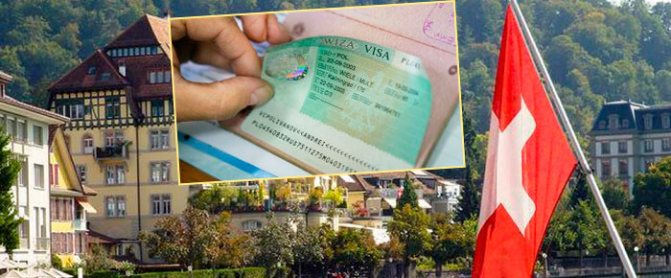
To obtain it, you will need to draw up an employment contract with an employer in Switzerland, sign it and obtain a work permit. Only if you have these papers should you contact the Swiss Consulate to apply for a work visa.
The basic package of documents for obtaining a work visa includes:
- Application form - filled out in English or one of the official languages of the country (3 copies).
- International passport and 3 copies of visas - if there are two or more blank pages, and with a validity period of at least 3 months from the date of entry into Switzerland.
- Civil ID card.
- Photo – 4 pcs.
- Certificate confirming no criminal record.
- Work permit in Switzerland.
- Employment contract and 3 copies.
If necessary, the list can be changed at the discretion of the Consulate specialist. The package of documents is submitted for registration to the Embassy at the place of actual stay by the applicant in person.
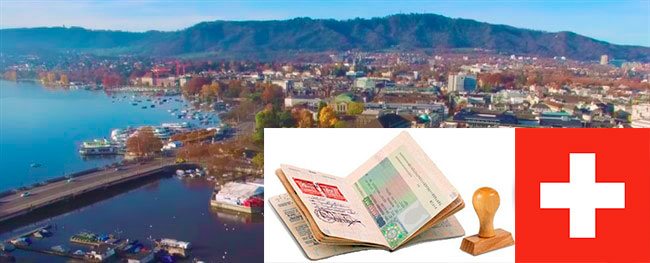
Documents are reviewed within two weeks. After receiving a work visa, upon arriving in the country, a foreigner must apply for a residence permit.
Unfortunately, the work visa cannot be extended.
Illegal employment
In Switzerland, the fight against illegal employment is ongoing. And quite successfully.
If an illegal worker is discovered, he is simply expelled from the country. However, he will no longer be able to re-enter Switzerland. At least for the next five years. Other measures of influence are also used against illegal immigrants. This could include a fine and even imprisonment of up to one year.
The employer is punished even more harshly. He is simply deprived of any government support. And the imposition of fines of up to one million CHF plus the threat of up to five years in prison “cools” those who like to use illegal hired labor.
Video: punishment for illegal employment in Switzerland
Show more
Show more

Switzerland needs workers from non-EU countries
This content was published on Jul 04, 2021 Jul 04, 2021 “The quota system has a negative impact on the Swiss economy,” said the Minister of Economy of the canton of Geneva and called for these quotas to be increased first.
Internship
Internships in Switzerland are popular among university students and graduates. This is an opportunity to obtain good professional practice, and at leading enterprises in one of the most economically developed European countries.
The internship can last from several months to one year or more. Sometimes the employer assigns a probationary period. Switzerland is strict about this. For violation of labor discipline, the trainee may be denied further internship.

University students and graduates get good practice during an internship in Switzerland
There are several ways to get an internship in Switzerland:
- under the student exchange program;
- through international projects (including volunteer ones);
- through an independent search for enterprises and personal contact with their management.
I came to Switzerland as part of an exchange program between countries for an internship. True, 7 years ago. I found a work placement and internship with the help of an intermediary company in Switzerland, and processed everything through the Russian Migration Service.
Alisa Natasha
https://forum.ladoshki.ch/archive/index.php/t-24563.html
Business immigration
Foreigners have the right to acquire and establish companies in Switzerland. The creation of new jobs for the country's citizens is especially welcome. To obtain a residence permit based on a business, a foreigner must present a development plan and argue for the benefit of the enterprise for the given region.

Registering your own company in Switzerland opens up great business prospects
The newly created company must work realistically. In Switzerland this is being closely monitored. Do not be deceived that it is enough to open a company only on paper. If there is no activity and no taxes are received, the company registration will be canceled.
A large investor can move to Switzerland without any problems. It is enough to purchase an operating company in the country worth at least 1.5 million CHF. Or invest a large amount (with an annual return of 150 thousand CHF) in a bank. But this method is available only to rich people. Investments in real estate will not be grounds for immigration.
You can open a management, holding, production company, representative office or branch. Registering your company today is the most reliable, but quite expensive way to move to the country.
Gregory
https://kompromata.net/immigration_to/switzerland.html





